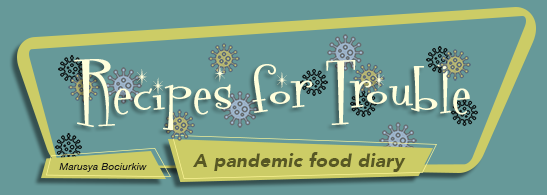Reading Recipes, Putting Out Kitchen Fires
Has a recipe ever performed a healing or transformative role in your life?
The earliest recipe books did not concern themselves with soup and pastry: they provided directions for magic. Papyrus relics from Egypt, written in Greek, Egyptian, Hebrew and Aramaic attest to a range of recipes for spells and healing potions.
Later, as recipe books became more tied to culinary lore, herbal and magical remedies would often appear in the margins. Sometimes, as in my mother’s Ukrainian Catholic Women’s League cookbooks, fanciful concoctions appeared at the ends of chapters, unconsciously echoing the supernatural tone of the earliest recipes ever written.
Recipe For Happiness
Into a large bowl pour a full cup of Thoughtfulness
Add a generous helping of Friendship,
Mix in equal amounts of Generosity, Kindliness and Charity….
From Tested Recipes, published by the Ukrainian Catholic Women’s League of St Josaphat’s Parish, 1963
The other night The Gay Schoolteacher came over for dinner. His beautiful smile faded slightly when he saw me. Blood was gushing from my finger, and my oven was erupting into flames.
I was trying out a new recipe, from Nigel Slater’s The Kitchen Diaries, which I got for Christmas. Slater is food writer for The Guardian and the author of eight books. Kitchen Diaries is an account of Slater’s activities in the kitchen, over the period of a year. As such it’s a rather prosaic account of weather, shopping and cooking: lovely at first, and with great photos, and then a bit repetitious.
The bloody gash was my fault, but the fat fire could have been blamed on the recipe. It didn’t specify the size of the pot (mine was way too small), and there was too much fat in the recipe. And then there was the fact that I was seriously in the weeds with marking, and seriously not capable of cooking a meal without courting disaster.
But back to Kitchen Diaries. I do like how casual the author is. Lunch may be a complex stew but dinner might just be cooked rainbow chard tossed with olives and lemon olive oil, eaten on sourdough toast: “A supper that fills us with joy.”
Recipe-wise, the book’s a tad frustrating since there’s no separate index for the recipes: you may be intrigued by his chickpea-squash curry and you may never find it again. (which makes me wonder if I should index the recipes in my next food memoir)!
I made Slater’s chicken stew. It was quite a bit of work for a gal with teaching, marking, research, writing, and a radio interview to do. The marinade demanded six ingredients, and the chicken needed to marinate overnight (or in my case, a scant two hours). The Gay School Teacher helped me bandage up my finger, and the fire subsided without the intervention of municipal authorities.
We were pretty happy to sit down to dinner. The stew didn’t quite deliver on flavour but texturally it was perfect for a chilly almost-spring March evening, and two old friends engaging in a conversation that has spanned more than three decades. Recipe for happiness? Yeah, I think so, with mashed potatoes, some good French wine and The Schoolteacher’s spicy chocolate cake thrown in.
How do you use recipes? What cookbooks got you through the winter? What’s your magic culinary recipe these tentative, almost-spring days?
Chicken Stew
I’ve tweaked Slater’s recipe to make it easier and more flavourful. It’s also much improved the following day.
1 can cannelini or Romano beans
A large chicken, cut into 8 pieces
25 ml olive oil
50 ml balsamic vinegar
8 plump cloves garlic, peeled
3 or 4 bay leaves
2 teaspoons herbes de Provence
1 teaspoon tarragon
Grated orange zest from 1 large orange
1/4 cup orange juice
1 teaspoon kosher salt
several grinds of black pepper
6 medium leeks, thinly sliced
2 medium sized sweet potatoes, peeled and chopped
1/2 litre chicken stock
splash of white wine or vermouth
Combine balsamic vinegar, olive oil, garlic, bay leaves, herbs, orange zest, orange juice, salt and pepper in a large non-reactive bowl. Add chicken, making sure to coat it completely. Place in a cool place for 3-4 hours or overnight.
Set oven at 300 degrees. Brown chicken pieces until golden in a large non stick fry pan, shaking off and reserving the marinade before you do. Place chicken in a large Dutch oven. Deglaze fry pan with wine or vermouth, then add leeks and garlic. When softened, add marinade and chicken stock and let it come to a boil. Add the beans and sweet potato to the chicken then add the liquid. Cover, and place in oven for 1 to 2 hours or until chicken is cooked through. Add salt, pepper to taste. Serve over polenta or mashed potatoes.





Great interview! It brought up a lot of the issues we’ve been discussing here in Vancouver and the tension between those who wanted to “Believe” and those who wanted a critical discussion, even as those emotional waves were passing through all of us as we watched those human/superhuman athletes.
Your post made me smile. What a moment in time you have captured. I was transported.
Love to try this one..thanks
Lori,
I’m glad I was able to touch on some common issues, and that others have also been discussing the vexing contradictions that Olympics bring up.
Tracy,
I like your writing too!
Day Recipe,
Let me know how it turns out and the ways that you make the recipe your own.